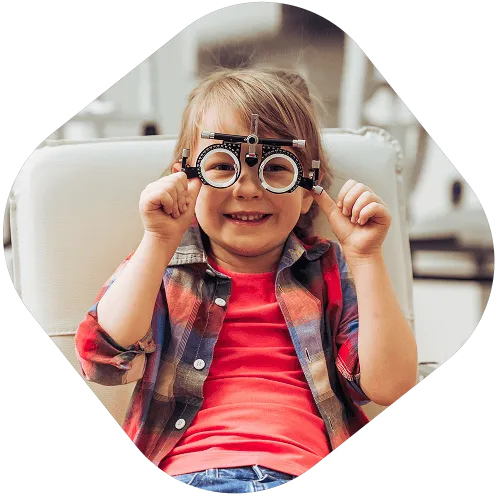
Pediatric Ophthalmology
Welcome to Medicover Hospitals, where your child's visual health is our priority. Our Pediatric Ophthalmology department specializes in comprehensive eye care for children, ensuring their precious eyes receive the best attention and care they deserve.
Why Choose Us
-
Top Class pediatric ophthalmology services
-
prioritizing your child's eye health and well-being.
-
Our expert team
-
Child-friendly approach
-
The latest technology ensures your child receives the best care possible.
Contact us today to schedule an appointment and take the first step toward preserving your child's vision.
Our Pediatric Ophthalmology Services:
At Medicover Hospitals, our team of skilled and compassionate pediatric ophthalmologists is dedicated to providing a wide range of specialized eye care services tailored specifically for children. We prioritize the specific requirements of our young patients and aim to create a comfortable, stress-free experience for them.
Expert Pediatric Ophthalmologists:
Our board-certified pediatric ophthalmologists are experts in diagnosing and treating various eye conditions that affect children. From routine eye check-ups to complex surgeries, our specialists have the knowledge and experience to provide the highest level of care.
Comprehensive Eye Examinations:
We offer comprehensive eye examinations designed to assess your child's visual health and detect potential issues early on. Regular eye check-ups are essential to monitor your child's eye development and address any concerns promptly.
Treatment of Pediatric Eye Conditions:
Our pediatric ophthalmology team is equipped to diagnose and manage various eye conditions that affect children, including amblyopia (lazy eye), strabismus (crossed eyes), refractive errors, and more. Our treatment plans are customized to meet your child's unique visual needs and promote optimal development.
-
Pediatric Eye Surgery: In cases where surgical intervention is necessary, you can trust our skilled pediatric ophthalmologists to perform delicate procedures with precision and care. Your child's safety and well-being are our top priorities, from minor surgeries to complex processes.
-
Child-Friendly Environment: We understand that visiting the doctor can be intimidating for children. Our clinic is designed to create a warm and welcoming environment that helps ease anxiety. Our friendly staff and specialized care ensure your child's experience is positive and stress-free.
Frequently Asked Questions
What is Pediatric Ophthalmology?
Pediatric Ophthalmology is a specialized branch of medicine that focuses on the diagnosis and treatment of eye conditions and visual problems in children, from infancy through adolescence.
When should my child have their first eye exam?
It is recommended that children have their first comprehensive eye examination at around six months of age. Early detection of eye issues is crucial for the proper development of a child's vision.
How often should my child have their eyes checked?
The frequency of eye check-ups depends on the child's age and any existing eye conditions. As a general guideline, children should have their eyes examined at least once between 6 months and 1 year, and then again between the ages of 3 and 5 years. Regular follow-up visits are essential for children with known eye problems.
What are some common eye conditions in children?
Common eye conditions in children include refractive errors (nearsightedness, farsightedness, and astigmatism), amblyopia (lazy eye), strabismus (misaligned eyes), congenital cataracts, blocked tear ducts, and eye infections.
How is amblyopia (lazy eye) treated in children?
Amblyopia is often treated by covering the stronger eye with an eye patch for a certain number of hours each day, which encourages the weaker eye to develop better vision. Other treatments may include atropine eye drops or vision therapy exercises.
Can vision problems in children be corrected with glasses?
Yes, many vision problems in children, such as nearsightedness, farsightedness, and astigmatism, can be effectively corrected with prescription glasses.
At what age can children start wearing contact lenses?
The use of contact lenses in children depends on their maturity level, responsibility, and specific eye conditions. In general, most eye care professionals recommend waiting until the early teenage years before considering contact lenses for children.
What happens during a pediatric eye exam?
A pediatric eye exam typically includes a comprehensive evaluation of the child's vision and eye health. The ophthalmologist will assess visual acuity, eye alignment, eye movement, and perform a dilated eye examination to check the internal structures of the eyes.
Is pediatric ophthalmic surgery safe for children?
Pediatric ophthalmic surgery can be safe and effective when performed by experienced and skilled ophthalmologists. Before any surgery, the ophthalmologist will thoroughly evaluate the child's condition and discuss the potential risks and benefits with the parents or guardians.
Can eye problems in children affect their learning and development?
Yes, untreated eye problems in children can significantly impact their learning and development. Uncorrected vision issues can lead to difficulties in reading, writing, and overall academic performance. Early detection and appropriate treatment are crucial for optimal visual development.
